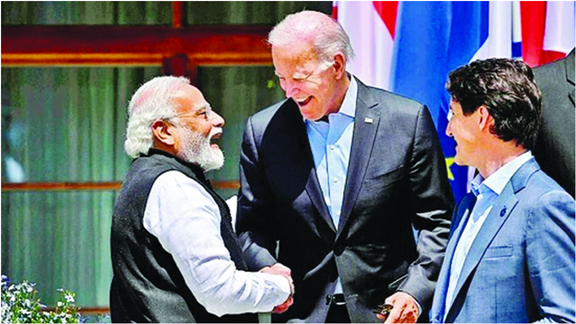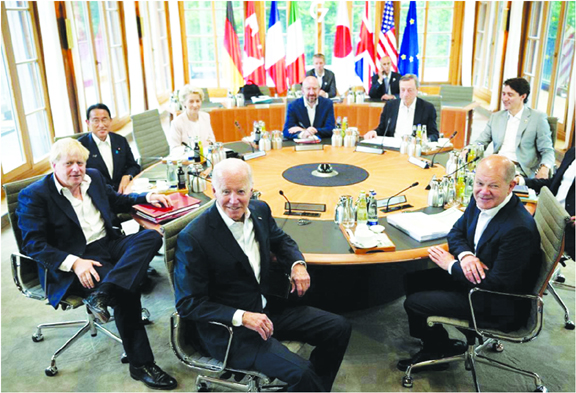
Elmau (TIP)- Leaders of the world’s wealthiest democracies struck a united stance to support Ukraine for “as long as it takes” as Russia‘s invasion grinds on, and said they would explore far-reaching steps to cap Kremlin income from oil sales that are financing the war. The final statement Tuesday, June 28, from the Group of Seven summit in Germany underlined their intent to impose “severe and immediate economic costs” on Russia. It left out key details on how the fossil fuel price caps would work in practice, setting up more discussion in the weeks ahead to “explore” measures to bar imports of Russian oil above a certain level. That would hit a key Russian source of income and, in theory, help relieve the energy price spikes and inflation afflicting the global economy as a result of the war. “We remain steadfast in our commitment to our unprecedented coordination on sanctions for as long as necessary, acting in unison at every stage,” the leaders said.
Leaders also agreed on a ban on imports of Russian gold and to step up aid to countries hit with food shortages by the blockage on Ukraine grain shipments through the Black Sea. The price cap would in theory work by barring service provides such as shippers or insurers from dealing with oil priced above a fixed level. That could work because the service providers are mostly located in the European Union or the UK and thus within reach of sanctions.
To be effective, however, it would have to involve as many consuming countries as possible, in particular India, where refiners have been snapping up cheap Russian oil shunned by Western traders. Details on how the proposal would be implemented were left for continuing talks in coming weeks. Before the summit’s close, leaders joined in condemning what they called the “abominable” Russian attack on a shopping mall in the town of Kremechuk, calling it a war crime and vowing that President Vladimir Putin and others involved “will be held to account”.
The leaders of the US, Germany, France, Italy, the UK, Canada and Japan on Monday pledged to support Ukraine “for as long as it takes” after conferring by video link with Ukrainian President Volodymyr Zelenskyy. The summit host, German Chancellor Olaf Scholz, said he “once again very emphatically set out the situation as Ukraine currently sees it.” Zelenskyy’s address came hours before Ukrainian officials reported a deadly Russian missile strike on a crowded shopping mall in the central city of Kremenchuk. From the secluded Schloss Elmau hotel in the Bavarian Alps, the G-7 leaders will move to Madrid for a summit of NATO leaders, where fallout from Russia’s invasion of Ukraine will again dominate the agenda. All G-7 members other than Japan are NATO members, and Japanese Prime Minister Fumio Kishida has been invited to Madrid.
Zelenskyy has openly worried that the West has become fatigued by the cost of a war that is contributing to soaring energy costs and price hikes on essential goods around the globe. The G-7 has sought to assuage those concerns.
While the group’s annual gathering has been dominated by Ukraine and by the war’s knock-on effects, such as the challenge to food supplies in parts of the world caused by the interruption of Ukrainian grain exports, Scholz has been keen to show that the G-7 also can move ahead on pre-war priorities. Members of the Group of Seven major economies pledged Tuesday to create a new climate club for nations that want to take more ambitious action to tackle global warming.
The move, championed by Scholz, will see countries that join the club agree on tougher measures to reduce greenhouse gas emissions with the aim of keeping global temperatures from rising more than 1.5 Celsius (2.7 Fahrenheit) this century compared with pre-industrial times. Countries that are part of the club will try to harmonise their measures in such a way that they are comparable and avoid members imposing climate-related tariffs on each others’ imports. Speaking at the end of the three-day summit in Elmau, Germany, Scholz said the aim was to “ensure that protecting the climate is a competitive advantage, not a disadvantage”. He said details of the planned climate club would be finalised this year. Source: AP
Modi lavishes gifts for G7 leaders
Gulabi Meenakari brooch, cufflink, Black Pottery, Platinum painted hand painted Tea Set, and Zari Zardozi box were among the few specialised items gifted by Prime Minister Narendra Modi to Group of Seven leaders during his two-day visit to Germany. PM Modi was the senior most global leader holding country’s top office at the G7 summit and carried special gifts for all the leaders made under UP one district one product scheme. He has already attended three G7 summits on invitation, highlighting India importance in global scheme of things.
PM Modi gifted US President Joe Biden Gulabi Meenakari brooch, a piece of pure silver which is moulded into a base form, and the chosen design is embossed in the metal. It is a GI tagged art-form of Varanasi in Uttar Pradesh. The cufflinks were prepared for Biden with a matching brooch for the First Lady, Jill Biden. French President Emmanuel Macron received a carrier box crafted in Lucknow. The Zari Zardozi box was hand embroidered on khadi silk and satin tissue in the three colours of the French National Flag, which has its origin in the French Revolution. The box included Attar Mitti – a unique attar produced in UP’s Kannauj – Jasmine Oil, Attar Shamama, Attar Gulab, Exotic Musk, and Garam Masala.
Prime Minister Modi gifted platinum painted hand painted tea set from Bulandhshahr district to British Prime Minister Boris Johnson. According to Prime Minister’s Office, the crockery has been outlined with platinum metal paint in honour of Queen Elizabeth’s platinum jubilee being celebrated this year.
Source: HT
